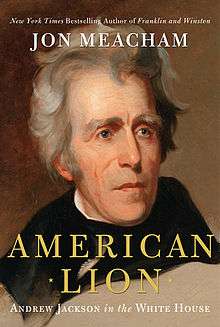American Lion (book)
 | |
| Author | Jon Meacham |
|---|---|
| Country | United States |
| Language | English |
| Genre | Presidential Biography |
| Publisher | Random House |
Publication date | November 11, 2008 |
| Media type | Print (Hardcover & Paperback) |
| Pages | 512 pages |
| ISBN | 1-4000-6325-6 |
| 973.56092 | |
American Lion: Andrew Jackson in the White House is a 2008 biography by Jon Meacham of Andrew Jackson, the seventh President of the United States. It won the 2009 Pulitzer Prize for Biography.[1] In 2017 it will be made into a television miniseries for HBO, starring Sean Penn.
Meacham, the editor of Newsweek magazine, said he named the book American Lion as an attempt "not to lionize Jackson but to capture the contradictions at his core. If he were on your side, he would do all he could to protect you. If he believed you a foe, then he was a ferocious and merciless predator."[2] He chose to write the book because he felt "Jackson represents the best of us and the worst of us", citing Jackson's simultaneous capacity for both kindness and cruelty. Meacham said he sought not to whitewash Jackson or "all his sins, which are enormous",[2] such as his support of slavery and Indian removal.[2] Meacham said he believes understanding Jackson helps understand the shape of American politics, including popular campaigning techniques, media manipulation, and engaging citizens in the narrative of politics while simultaneously governing. Meacham said, "All of these features flowered in the age of Jackson, and they all feel very contemporary."[3]
Meacham's book was published within five years of the release of several books about Andrew Jackson by such authors as Sean Wilentz, Daniel Walker Howe and Andrew Burstein. Robert Roper, an author who reviewed American Lion for the Los Angeles Times, said Meacham's book did not contest the portraits painted in those books, but rather it "selectively enriches that version with graceful new readings of some formerly overlooked primary materials," including the private papers of members of Jackson's family circle,[4] Most of the previously unpublished correspondence was found in archives at The Hermitage, Jackson's estate in Nashville, Tennessee. American Lion focuses a great deal on the Bank War, the federal tariff on imports,[5] and the Petticoat affair, of which Meacham claims in his book, "the future of the American presidency was at stake".[4]
American Lion received generally positive reviews.[6] In The Washington Post, Douglas Brinkley called it "the most readable single-volume biography ever written of our seventh president".[5] The New York Times literary critic Janet Maslin called it a "carefully analytical biography (which) looks past the theatrics and posturing to the essential elements of Jackson’s many showdowns".[7] Presidential biographer Doris Kearns Goodwin called American Lion "a beautifully written, absolutely riveting story",[6] and historian Michael Beschloss called it "a spellbinding, brilliant and irresistible journey (that) shows us how the old hero transformed both the American presidency and the nation he led."[6] When the Pulitzer Prize jury awarded the book in 2009, it called the prose "agile" and the book an "unflinching portrait".[6]
References
- ↑ Kellogg, Carolyn (2009-04-20). "Jon Meacham's "American Lion" takes Pulitzer Prize for biography". Los Angeles Times. Retrieved 2009-11-17.
- 1 2 3 "Book World Live: Jon Meacham, Author of "American Lion"". The Washington Post. 2008-12-16. Retrieved 2009-11-17.
- ↑ Bentley, Rosalind (2008-12-14). "Sunday Conversation With...Jon Meacham". The Atlanta Journal-Constitution. Retrieved 2009-11-17.
- 1 2 Roper, Robert (2008-12-14). ""American Lion: Andrew Jackson in the White House" by John Meacham". Los Angeles Times. Retrieved 2009-11-17.
- 1 2 Brinkley, Douglas (2008-11-02). "The Warrior President". The Washington Post. Retrieved 2009-11-17.
- 1 2 3 4 "Pulitzer Prize for Jon Meacham". Chattanooga Times Free Press. 2009-04-23. Retrieved 2009-11-17.
- ↑ Maslin, Janet (2008-11-10). "Books of the Times: Elites and Rivals, Beware: He's Tough as Old Hickory". The New York Times. Retrieved 2009-11-17.